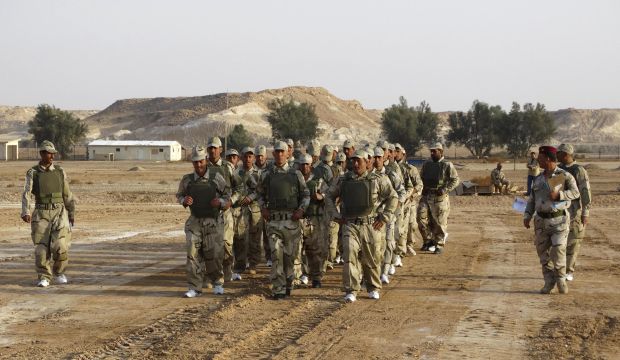
Tribal fighters take part in military training to prepare for fighting against Islamic state of Iraq and Syria (ISIS) militants, at the Ain Al-Assad military base in Iraq’s Anbar province, on November 15, 2014. (Reuters)
Baghdad, Asharq Al-Awsat—Suspected Islamic State of Iraq and Syria (ISIS) fighters launched a major assault on pro-government tribal forces in Anbar just one day after Iraqi Prime Minister Haider Al-Abadi called for a “tribal revolution” against the extremist group.
During a meeting with Anbar Governor Suhaib Al-Rawi on Monday, Abadi highlighted the important role being played by Iraq’s Sunni tribes in the fight against ISIS, which he dubbed a “foreign enemy.” He called on the “sons of [Iraq’s] provinces” to participate in liberating the country from the group.
Just one day after his comments, suspected ISIS fighters launched a major attack on the Ain Al-Assad base in western Anbar on Tuesday, killing at least 23 Iraqi troops and pro-government fighters. A suicide bombing at a mosque in Al-Jubba on Tuesday, close to Ain Al-Assad, killed 10 anti-jihadist fighters, with jihadist militants subsequently attacking police and army positions in the region, killing at least 13, according to Iraqi officials.
Embattled Sunni tribes in Iraq’s western-most province have continued to fight against ISIS, which has been in control of parts of the provincial capital Ramadi for months, but warn they are running out of arms and ammunition due to a lack of government support.
While the US-backed international anti-ISIS coalition has carried out airstrikes across Iraq, the strikes have focused on targets in central and northern parts of the country, not Anbar, where ISIS is well-entrenched.
Speaking during an Iraqi army graduation ceremony on Tuesday, Abadi said: “The day when we will be victorious against ISIS fighters is fast approaching and we will liberate our cities and provinces from this terrorist desecration.”
“All of our military efforts are seeking the full liberation of Iraq,” he added. Abadi was speaking before news of the attack on the Ain Al-Assad base in western Anbar broke.
Sheikh Rafi Al-Fahdawi, leader of the pro-government Albufahd tribe, called on Baghdad to provide more training and arms to tribal fighters in Anbar province.
“Liberating the different cities and territory that are under ISIS control requires appropriate training and arms, which is something that we have not received until now,” he told Asharq Al-Awsat.
“We cannot say that the battle to liberate [Anbar] is looming,” he added.
The Albufahd tribe is one of the main Anbar tribes fighting against ISIS, and has previously clashed with ISIS fighters in Ramadi and Fallujah, large parts of which remain outside of government control.
Fahdawi said that while government troops, backed by tribal forces, have been able to liberate territory in Anbar from ISIS, the group is able to quickly retake this due to a lack of sufficient troops, training and arms to hold onto territory.
“Military units and tribal fighters are receiving some training at the Ain Al-Assad base [in western Anbar] but this is not sufficient to take part in a major battle, particularly as ISIS still has the ability to maneuver [in the province] and so we need to cut off its supply lines, which represents one of the group’s main strengths,” he said.
